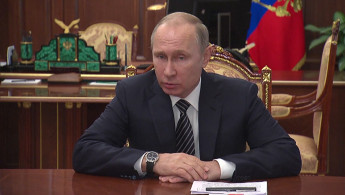Syria's main factions agree ceasefire that excludes jihadists
Damascus and the "main forces of the armed opposition" had signed a document on a ceasefire in Syria and also an announcement on their readiness to start peace talks, he said according to television reports.
Putin also confirmed there will be a "reduction" of Moscow's forces in Syria after Damascus and rebels inked a truce deal.
"I agree with the proposal from the defence ministry for the reduction of our military presence in Syria," Putin said in a televised meeting, insisting Russia would still continue to support Syrian President Bashar al-Assad.
Syria's army said it would halt all military operations from midnight in response to the signed ceasefire agreement.
"The general command of the armed forces announces a complete halt to all hostilities on Syrian territory from the zero hour of December 30th," it said in a statement.
It added that the halt excluded combat against the Islamic State group and the former al-Qaeda affiliate previously known as al-Nusra Front.
The United States on Thursday called the ceasefire deal in Syria brokered by Russia and Turkey a "positive development," saying it hoped it would lead to fresh talks on the war-wracked country's political future.
"We hope it will be implemented fully and respected by all parties," State Department spokesman Mark Toner said in a statement, emphasising that Washington was not part of the ceasefire negotiations.
"Any effort that stops the violence, saves lives, and creates the conditions for renewed and productive political negotiations would be welcome."
The news came as details emerged of a proposed deal between Russia, Turkey and Iran to bring the war in Syria to an end by carving the country into three zones of influence.
But the deal, which would allow regional autonomy within a federal structure controlled by Assad's Alawite sect, is in its infancy, subject to change and would need the buy-in of Assad and the rebels as well as the Gulf states and the United States, sources told Reuters.
Foreign and defence ministers from Russia, Turkey and Iran met in Moscow on 20 December and set out the principles they thought any Syria deal should adhere to.
Russian sources say the first step is to get a nationwide ceasefire and then to get talks underway.
Negotiations between Syrian regime and opposition representatives are scheduled to begin in mid-January in Astana, the capital of Kazakhstan, a close Russian ally.
Hundreds of thousands have lost their lives over the course of Syria's now nearly six-year civil war.
Both the Syrian regime and its Russian backers have been accused of committing war crimes in Aleppo.





 Follow the Middle East's top stories in English at The New Arab on Google News
Follow the Middle East's top stories in English at The New Arab on Google News
![Israeli forces ordered bombed Gaza's Jabalia, ordering residents to leave [Getty]](/sites/default/files/styles/image_330x185/public/2176418030.jpeg?h=a5f2f23a&itok=_YGZaP1z)

